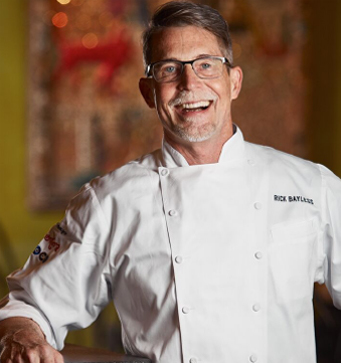

A Force To Be Reckoned With
For three decades chef Rick Bayless has led a culinary mission centered on transparency and deep cultural exploration.
By Amanda Faison
Most everything about Rick Bayless, the Chicago-based chef and co-owner of the beloved Frontera restaurant group, has been written. He’s a celebrity chef, a cookbook author, a TV star, a pioneer, an activist, a philanthropist, a gardener, a yogi, a husband, a father. After three decades of opening restaurants that mine the rich depths of Mexican cuisine (his flagship, Frontera Grill, just celebrated its 30th anniversary in May), Bayless remains as relevant than ever. Last August he opened two spots in Chicago’s West Loop: Cruz Blanca Brewery & Taquería, a Oaxaca-style cevichería and taquería, and Leña Brava, a wood-fired eatery that pays homage to the food of Baja Norte. And just last month, the day after Frontera Grill’s birthday bash, Bayless won his eighth James Beard Award, this time for Outstanding Restaurant for Topolobampo. He collected this same accolade for Frontera Grill in 2007.
Bayless’ empire has grown to include nine restaurants, a PBS show called “Mexico—One Plate At A Time” (now in its 11th season), a line of food products, and eight cookbooks. In 2003, he founded the Frontera Farmer Foundation, a 501(c)(3) dedicated to promoting small, sustainable farms in the Chicago area. Along the way, Bayless has become a household name and the very best kind of celebrity chef—one with a conscience. His restaurants honor the whole of Mexico’s diverse cuisine but only through the use of good, wholesome ingredients.
In April, Bayless traveled to Boulder, Colorado, for the Conference on World Affairs where he was the keynote speaker on a panel titled Why Food Matters: Nourishing Our Bodies and the Land. That discussion, plus a one-on-one interview after the fact, allowed the Good Food 100 to distill down what Bayless, who is a GF100 ambassador, stands for and the messages his restaurants carry forth daily.
On food today… “When we break food apart and think of it as composite parts, as mere fuel, that makes us look at food as an abstract. All that undermines the way it sustains our body. We have to think about food in relation to nature: It has to be seasonal. Food has become disconnected from time and place and family and community. We’re in a bad place. We have to go back to looking at food as more than fuel.”
On what good food means… “For me, good food is at its essence natural and unprocessed. By unprocessed I mean it’s raised in a way that won’t compromise the world for future generations and it’s something that fits into the community. There has to be some sort of community aspect, sharing at the table with family or relating to the place where you live.”
On food as a mirror… “Food is so expressive of culture and yet we’ve disconnected from the nourishing foods that our people developed. Take the burrito bowl, when you eat it, do you feel disenfranchised? Food needs to resonate with our past.”
On affecting change… “I’m grass roots type guy. I think you can change the system by doing small things along the way. Eventually there will be critical mass and things will tip.”
On eating alone… “In the last 30 years, we’ve started eating more away from the home. For the first time in the human race, we’ve started eating alone. How do you build family and community over a solitary meal?”
On teaching taste… “We do a spinach tasting with kids. We start with one leaf of spinach and they taste it, chew it, and pucker up their faces. We ask ‘What is the flavor you tasted? What do you not like about it?’ If it’s bitter, as a cook you can balance that bitterness with fat or sweetness. To me, it’s a way to get kids to understand it’s not the thing, it’s what you do with the thing.”
On growing your own food… “I’ve always wanted to be able to grow things for our restaurant. You can’t be a good chef unless you understand how food is grown. And the difficulty of growing food, you need to understand that too.
On urban farming… “We think of farms as bucolic things that you paint and hang above your couch. But you can grow stuff anywhere. If we’re smart as farmers and gardeners, we’ll have the opportunity to do more. I have this desire to show people you can grow food in small plots. It doesn’t have to be something that is huge, it can be part of your everyday part of life.”
On nonnegotiables… “Deliciousness is a prerequisite. When you look at food as fuel, you take delicious out of the equation. Deliciousness is beauty—the food equivalent of beauty. When you see a culture that turns its back on the arts, it’s a culture in decline.”
On ingredients… “I don’t believe there are unhealthy ingredients. Nothing is off the table. Everything is delicious and palatable in a healthy food system. I don’t want to live in a world where hot fudge sundaes are evil. We have to think about what nourishes us on a daily basis and what is to be celebrated. By removing certain foods, you’re taking celebration out of the equation and some foods are inherently celebratory.”